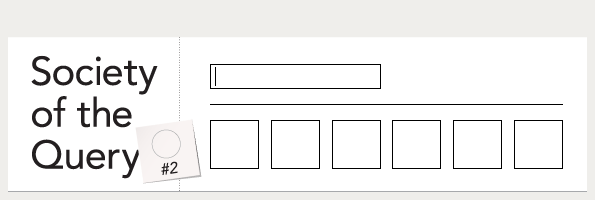Swiss historian of technology David Gugerli talked about the culture of the serach society during his speech at the Society of the Query. Gugerli emphasizes how searching has become a crucial part in every part of society. The author of “Search Engines. The World as a database” (review here) exemplifies this by mentioning the U.S. TV Show CSI, where a team of forensic investigators tries to clarify homocide cases. For Gugerli a dead body in a CSI show represents a database full of traces. The investigators search for the different traces and recombine them in order to solve the criminal case. The whole process of searching becomes the main part of the CSI story, CSI depicts the world as a database.

Using this example David Gugerli leads the hearer to his observation that data management systems have become a crucial variable shaping our real social world. The usage of database management systems has become an instrument to produce and to influence social change, by those managing databases and by those using it. To understand the major significance of database management systems it is important to be aware of the history of databases which has produced the enormous flexibility of modern database systems.
The idea of databases serving as a pool full of endless information emerged in the 1960s because of the society becoming more complex and therefore producing more complex data. Databases at this time were only able to answer foreseen questions, they were build for the purpose of providing answers for certain questions. But the emerging idea was that databases should be able to give answers to unexpected questions and to recombine information.
Gugerli describes the theoretical work which emerged during the 1970s and enabled the development of databases able to provide answers to new questions. The main question people dealt with was how to separate the process of retrieving information from the process of storing information. Until this idea came up the programmers creating and feeding the databases were also the only people being able to use them and extract information of them.

Mathematician and database theorist Edgar F. „Ted“ Codd produced basic work for the development of the relational data base. His goal was to split the knowledge about how to use a data base from the knowledge about how a database is structured. To do this Codd contributed to the development of a search and query language (SEQUEL = Structured English Query Language). This language build the basis for the aim to enable access to databases to people not having knowledge about the architecture of the database and in this way took the power from the programmer.
Gugerli links this shift in database theory, which enabled a new way of asking and interpreting with ideas of critical french authors like Barthes, Derrida, Foucault. They stated that the interpretation of a text cannot be determined by the author beforehand, there is an interpretative flexibility. In Gugerli‘s point of view this flexibility also entered the database sciences. As a result of this shift there also emerge consequences for social reality: new organizational strucutres, new administration forms, new forms of allocation. Gugerli sees an example for these consequences in the modern 20th century enterprise using highly complex logistics, supply chain management and real time production for example. These forms are supported or even determined by database management systems.


